IRGC-Linked Newspaper Slams Iranians Supporting Ukraine
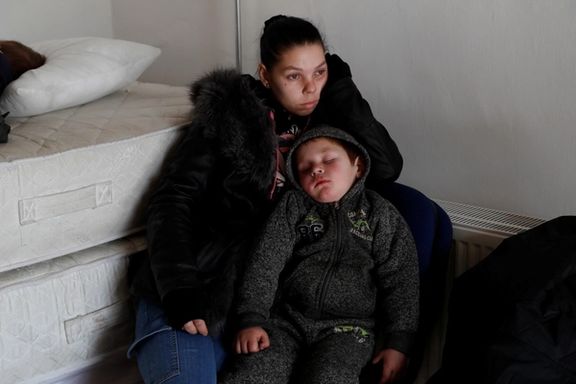
Javan newspaper, linked to Iran’s Revolutionary Guard, has criticized the support voiced for Ukrain by many ordinary Iranians and activists on social media.

Javan newspaper, linked to Iran’s Revolutionary Guard, has criticized the support voiced for Ukrain by many ordinary Iranians and activists on social media.
The daily said in its Monday issue that those who portrayed the Iranian government as a proponent of the Russian invasion are "Western puppets" and “extremist reformists".
The article added that they are more concerned about the fall of the US-backed government in Ukraine than the lives of the Ukrainian people.
It also described the crisis in Ukraine the result of NATO's eastward expansion that stem from “US and European sedition”.
The IRGC-linked paper called President Volodymyr Zelenskyy “a comedian and actor” who plugged his country to the abyss of a devastating war.
Many Iranians on social media have praised Zelensky, who has refused to leave Kiev in order to stiffen resistance, with some comparing him to former Afghan President Ashraf Ghani who fled the country as the US-trained army collapsed last summer when the Taliban advanced.
The debate about Russia’s invasion of Ukraine continues in Iran, with divisions reflecting wider disagreements among various factions over foreign policy. While reformists have been more critical of Russia, and social media has aired decidedly anti-Russian sentiments, hardliner media has sided with Russia.
Many ordinary Iranians invariably support Ukraine and condemn the government pro-Russia policies.
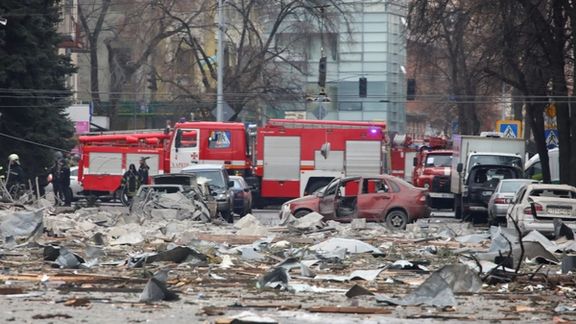
Iran's Supreme Leader on Tuesday said Iran is against war in Ukraine but held the US responsible for disrupting its stability and "creating a colored coup".
Reiterating that the US and Western countries cannot be trusted, Supreme Leader Ali Khamenei said Ukraine has fallen victim to US policies and the crises created by Washington without mentioning Russia's invasion in his speech.
He added that Iran opposes the killing of people and the destruction of the infrastructures belonging to other nations and added that Iran wants the war in Ukraine to end. "But resolving any crisis is only possible if its root causes are identified. The Ukrainian crisis is rooted in American policies, Western policies".
“The US disrupted the stability of the country by interfering in its affairs and organizing rallies and creating a colored coup,” he said, possible referring to the revolution in 2014 that toppled Ukraine’s former president Viktor Yanukovych. In a televised speech Khamenei claimed that people in Ukraine "did not enter the scene [to defend their country] because they did not recognize [the legitimacy of] their government."
Khamenei’s distortion of the facts on the ground were obvious. The world has been in awe as Ukrainians of all walks of life have joined volunteer forces to fight against Russia’s invading forces.
After widespread protests following the disputed re-election in 2009 of ultra-conservative Mahmoud Ahmadinejad, Khamenei blamed Western powers, particularly Britain, for instigating "sedition" in Iran. The protests became known as the ‘Green Movement’.
"What they did in 2009 was a new initiative which was Americans' initiative…It was a color revolution, actually a color coup, an unsuccessful color coup," he said in a speech on January 9, 2016. "The coup was an attempt to incite a full-scale civil war in Iran [to pave the way] for foreign domination."
Calling the governments of President Volodymyr Zelenskyy and former Afghan president Ashraf Ghani "puppet regimes", he said they had both confessed that the US had abandoned them when crises arose at home.
Zelenskyy’s Twitter account has jumped to nearly four million followers in recent days and his determination to resist the invasion has changed long-held European policies of low defense spending and transfer of weapons.
In the speech that marked Eid al-Mab’ath – the anniversary of the Prophet Mohammad's announcement of his prophethood, Khamenei drew a parallel between the early Islamic history and current times and said the US is a perfect example and manifestation of modern "ignorance", as were the opponents of the Prophet in his time.
In the past few days, Iranian officials including President Ebrahim Raisi and Foreign Minister Hossein Amir-Abdollahian, also attributed the crisis in Ukraine to NATO and American “provocations".
Raisi also held a phone call with the Russian President Vladimir Putin on the first day of the Russian invasion. "The President of Iran expressed understanding with respect to Russia’s security concerns caused by the destabilizing actions of the United States and NATO," a Kremlin press release said Thursday evening.
Many Iranians and media outlets have a different view. "Contrary to the government's stance, the hearts of many Iranians are with the people of Ukraine and they condemn this aggression,” reformist commentator Sadegh Zibakalam tweeted February 26.
Some Iranian journalists and media have criticized Raisi's call. "What is the justification for Raisi's call to Putin on the first night of Russia's invasion of Ukraine and subtly supporting Russia?" Behrouz Azizi, an Iranian journalist who identifies himself a "moderate conservative", tweeted Thursday.
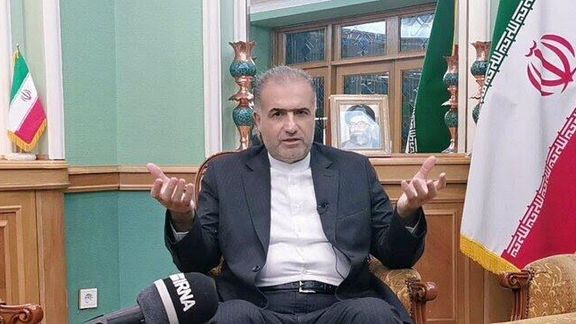
Iran's envoy to Russia has said NATO's expansion is not in the interest of Tehran and Moscow, and there is a global synergy against Western “unilateralism.”
The comments came as Iran has supported Russia’s invasion of Ukraine by blaming the United States and NATO for the ensuing crisis.
During a webinar about bilateral relations and regional developments, Kazem Jalali urged closer cooperation with Moscow under President Vladimir Putin, saying, “We are working with Russia on regional issues, and have a successful experience in Syria’s case”, Jamaran News in Tehran reported on Monday.
"Obviously, neither we nor the Russians see NATO expanding to our borders in our interest," said Tehran’s ambassador in Moscow.
Turkey, a NATO member borders Iran in the northwest but has followed a neutral policy between the Washington and Tehran.
Jalali added that Russia has stood up to American unilateralism, noting that this is the same approach that the Islamic Republic has taken since the 1979 revolution.
Jalali noted that Iran did not have good relations with the Tsarist Russia, the Soviet Union, and in the post-Soviet period, adding, “The fourth era is the Putin era, which I think should be paid more attention to”.
Judging by the history of Iran-Russia relations, “some people ask why we should have relations with the Russians when we have such a history with them. We should know that during the Soviet era 25 million people were killed in the war with Germany” but that didn’t stop them to cooperate on the Nord Stream --the system of offshore natural gas pipelines in Europe that runs under the Baltic Sea from Russia to Germany.
He added that “we should look at the realities of today”, underlining that Iran’s new government prioritizes relations and strengthening cooperation with neighboring countries, and “Russia is a large economy.”
Jalali went on to say that “our foreign policy should serve Iran’s national interests”, urging to keep a balance between the West and the East.
In fact, in the past 30 years under Supreme Leader Ali Khamenei Iran’s foreign policy has increasingly tilted toward Russia and China. In the 1980s, when the founder of the Islamic Republic Ayatollah Ruhollah Khomeini was Supreme Leader, the country followed his dictum of “Neither West Nor the East.”
During the same event, former member of the parliament Elaheh Koulai described ties between Iran and Russia as one of the most important issues in Eurasia.
“There are bitter events in the history of Iran-Russia relations that have caused pessimism and Russophobia in Iranian society” she added.
She called for a balancing approach with Russia, Europe and the United States, saying, “we must try to use Russia to our advantage”.
Referring to the Russian invasion of Ukraine, Koulai said, “Iran must condemn Russia's military action against Ukraine and demand that the two sides sit down at the negotiating table”.
As debate about Russia’s invasion of Ukraine continues in Iran, divisions reflect the political dispositions of various factions over Tehran’s foreign policy.
Hardliners close to the core of the regime fiercely defend a pro-Russia policy, while their rivals within the regime argue for more balanced relations between the West and the East, meaning Moscow and Beijing.
Many ordinary Iranians and opponents of the Islamic Republic invariably support Ukraine and condemn the government pro-Russia policies on social media.
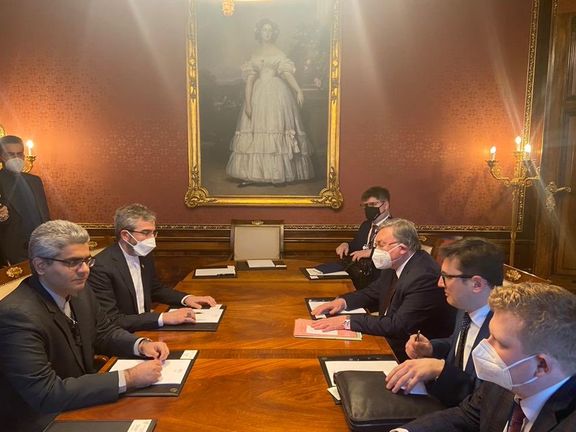
Media in Iran are hotly debating whether the Ukraine crisis will help Iran in its nuclear talks in Vienna or altogether lead to the failure of the negotiations.
Some commentators see benefits for the Islamic Republic as world powers are entangled in the biggest international confrontation since the 1960s Cuban Missiles crisis.
International relations analyst Mohammad Javad Jamali Nobandegani told Nameh News in Tehran, "We do not support the war, but problems created for some of the negotiators in Vienna could turn out to be in Iran's interest." He added that Russia as a country under sanctions could help Iran against “a common enemy."
He argued the West's inability to support Ukraine, might lead to a change of approach among Iran's neighbors who usually rely on the United States in their confrontation with Tehran.
This could have been a reference to the United Arab Emirates and other regional countries with good ties with Washington.
Former lawmaker Heshmatollah Falahatpisheh, on the other hand belives that the invasion of Ukraine has revealed Russia's weakness and that it is time for Iran to engage in direct talks with the United States and get rid of Russia as a mediator who is normally motivated by its own interest as Iran's rival in the global oil and gas market.
Iranian state TV commentator Jafar Ghannadbashi agreed with Falahatpisheh and said in an interview with Farda News that the situation is ripe for Iran to get concessions from the West. He said Russia's problems in Ukraine can affect Iran's nuclear talks although the extent of the impact of the Ukraine crisis on the nuclear talks depends on many factors.Ghannadbashi added that some analysts have exaggerated the impact of the Ukrainian crisis on the fate of the nuclear talks.
As a result of this crisis, Europe and America on the one hand, and Russia on the other, wish to garner support for their positions. This situation prompts both to offer concessions and this could end up in Iran’s interest, he said, adding that confrontations between big powers, which is reminiscent of the Cold War, can always serve the interests of countries like Iran.
Meanwhile, International relations expert and former diplomat Jalal Sadatian told Nameh News that there is no direct link between the war in Ukraine and the nuclear negotiations in Vienna. He said Iran might change its positions based on new developments but aggression against another country is absolutely not acceptable.
No politician in Iran has taken a tough stance in condemnation of Russia's aggression. This behavior has been criticized by some experts. However, those who support Russia's position expect Moscow to influence the negotiations in Vienna, Sadatian said.
However, he insisted that Iran should not act based on its ties with Russia and should condemn the war. "There is no justification for aggression against another country.
Meanwhile, he ruled out the hypotheses about the West and particularly the United States are tied up with the Ukraine crisis and will possibly cave in to Iran’s demands.
However, Sadatian agreed that the crisis in Ukraine could indirectly affect Iran. "For instance, now that we can sell more oil, the rise in the price of oil is in our interest. But this should not mislead us to believe that Russia, China, the European troika and the United States will forget about Iran's ambitions. I believe that is a simplistic analysis," Sadatian, a former adviser to former President Akbar Hashemi Rafsanjani, said.
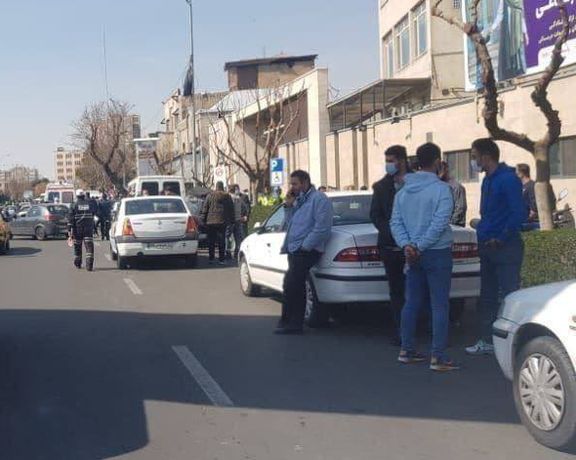
Dozens of active personnel and retirees of the armed forces have held protests in several Iranian cities to protest their poor living and working conditions.
According to videos posted on social media, the Monday rallies were held in front of the governor's offices in cities across the country such as Mashhad, Shahrekord, and Kermanshah while protesters in Tehran gathered in front of the parliament.
The demonstrations took place following a call circulated on the internet by the personnel and retirees of the armed forces to protest their low salaries.
Some former and current personnel received text messages from security agencies warning them against participating in the planned protests.
People from different walks of life, including teachers, nurses, and firefighters, have been holding regular protest rallies or strikes to demand higher salaries but such protests by the personnel of the armed forces are unprecedented.
In some other rare moves, staff members of the hardliner judiciary department and prison guards took to the streets in several cities across the country to protest their low salaries.
Earlier in January, the spokesman for Iran's police said salaries of police officers have increased several times in the previous nine monts, describing their living conditions as a major concern. However, the government cannot afford to pay substantially higher salaries in par with the rising food prices on top of high inflation in the previous few years.
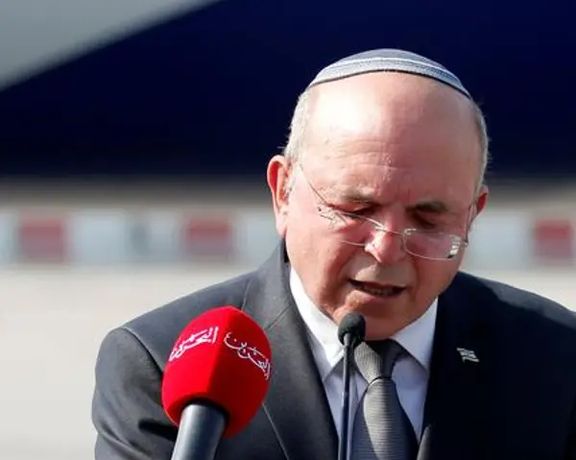
Israel's former national security adviser says the Russian invasion of Ukraine can spark a rush to conclude the deal between Iran and world powers.
Meir Ben-Shabbat, top Benjamin Netanyahu’s aide and Chief of Staff for National Security, says with the Ukraine crisis into its fifth day, the world’s attention as well as that of Israel has been focused on Eastern Europe, which can enable Tehran “to take advantage of the global tumult in order to make progress on the nuclear program and other areas”.
In an interview with the Times of Israelin Hebrew published on Monday, he described Iran’s nuclear program as a far more direct threat to Israel’s security, expressing concerns that “it looks like they are very close” to an agreement in Vienna.
“There could be effects in both directions”, he said, noting, “On the one hand, it could get in the way of the rush toward an agreement, because of the difficulty of bringing representatives to sign the agreement during this time. On the other hand, it could lead to the mistaken conclusion that a deal must be signed quickly in order to remove this issue from the agenda and to focus on the crisis in Europe”.
Some Iranian politicians also expressed cautious optimismthat the Russian invasion of Ukraine might speed up a nuclear deal between Tehran and Washington.